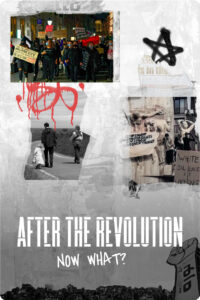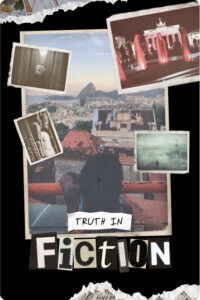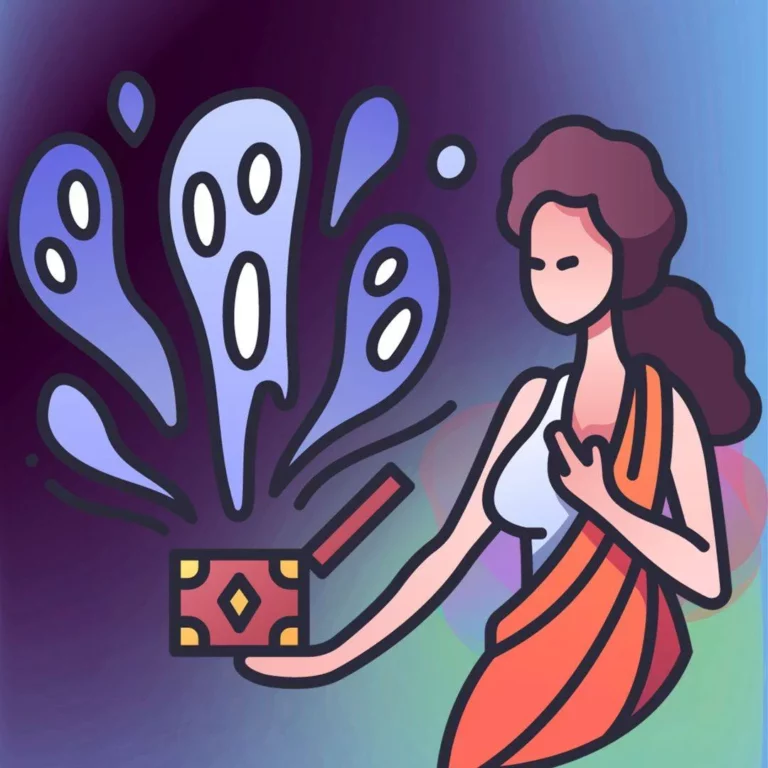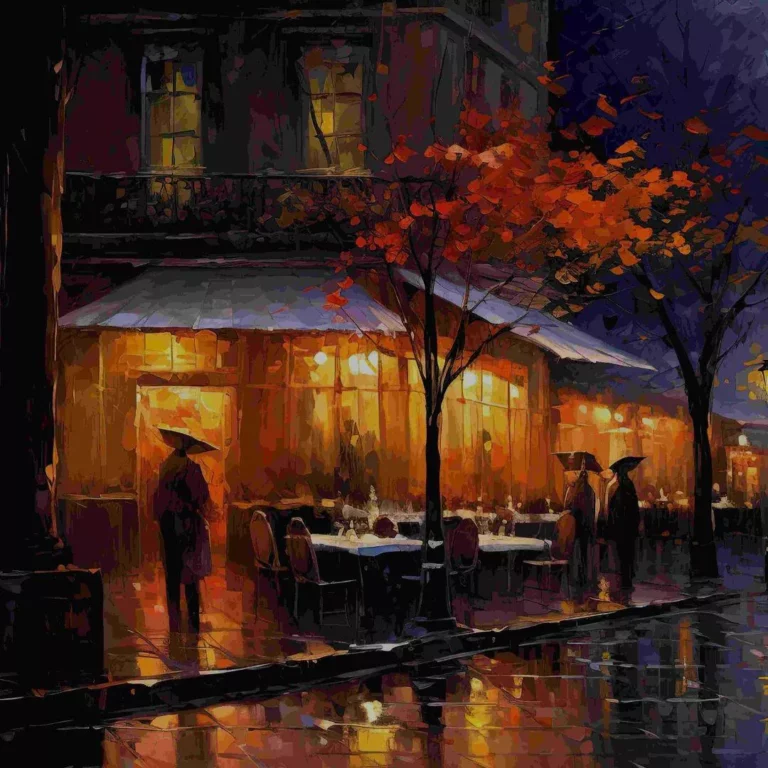You will find below the transcript of the podcast translated into English. Translator: Katie Dunnahoo.
I stumble upon it in a basement, at the last minute. The trunk of my car is already full, and I have to leave this afternoon. My father’s house is about to be sold. My father died eight years ago, his partner can no longer bear living by herself in the little house in the Pyrenees, in a deep valley. In the winter, the house is snowed in for months. To live here, you need snow tires, a generator, a well-stocked freezer, and a taste for solitude and silence.
In the house’s basement, there are some tools, a few boxes, old magazines, and bags of wood pellets for the stove. The box is there, under a thick coat of dust. It’s a wooden box, about the size of a briefcase or a small suitcase. The edges of the wood are worn, and the little strap hinges have traces of dust. Roughly speaking, I’d say it’s about sixty years old, maybe more. My father could have made it when he was a Compagnon du Tour de France, traveling around France doing his apprenticeship to become a craftsman in his early twenties. Unless it was his own father who made it, in which case it would be eighty years old, maybe a hundred.
I quickly wipe off the top with a rag and open it. Inside the box, there’s a tray with compartments underneath. A few family heirlooms, a missal, a plumb line, a small compass. And then some damp old papers, with a musty smell that makes my throat itch and makes me cough. I quickly realize that it’s the keepsake box of two generations, probably put together by my father. Some of these objects belonged to him, others to his parents.
To take stock of what I’ve found, I go out into the light of day and set the box on the plastic table on the patio. I inspect, I examine, I open the envelopes and decode the slanting letters. I study the old photos of people I don’t know. I recognize a medallion, and one of my father’s little woodworking tools.
A bundle of papers is held together by a rubber band. When I touch it, the band snaps, leaving a pale orange mark on the sheets it was holding together. There, in a separate little envelope, I find a photo of Pope Pius XII from 1950 and two little press clippings, two items cut out of a newspaper. They both have the same format, each has a photo and a caption.
The first clipping is a photo of a soldier, in uniform. Shot from below, we see his head turned slightly to the right, his bushy eyebrows below the kepi of a senior officer. The man seems tense, on guard. The caption reveals that the photo is of “the former General Gardy.” In the second photo, another soldier is looking straight ahead, his left hand on the back of his neck. You can’t tell if he’s saluting or scratching. It looks like a candid. Here, the note reads: “The former Captain Ferrandi, aide-de-camp to Salan, arrested Friday in Algiers, at the same time as the former general.”
For a moment I leave the box for my computer. I quickly find out that the two men, Gardy and Ferrandi, are soldiers of the OAS, l’Organisation Armée Secrète, or the Secret Army Organization.
The OAS is a clandestine French far-right organization, formed in 1961 to prevent the Évian negotiations from taking place following the Algerian War, and to keep Algeria under the yoke of French colonialism by any means necessary.
Sylvie Thénault is a director of research at the French National Center for Scientific Research: “This organization carried out attacks, it killed, for example, Commissaire Gavoury, who was a commissaire sent from mainland France to Algiers to dismantle the OAS. He was assassinated. Throughout 1962, the OAS was killing in an extremely violent way. The extreme violence at the end of the war is largely attributable to it, because the OAS wanted to prevent independence, so as the war was ending and independence seemed likely, it unleashed its violence. You can only imagine, the day of the cleaning women, when they killed cleaning women in the streets. An extremely robust violence. There were car bomb attacks, etc.”
I look at the two newspaper clippings for a long time. I notice that they are exactly the same size as the little image of Pope Pius XII, who was probably the most controversial pope of the 20th century. Elected pope in 1939, Pius XII has been accused of staying silent during World War II and never explicitly condemning the crimes of the Nazis or stating that the Jewish people had been victims.
Side by side with this photo, the newspaper clippings look like the icons of saints that my grandmother used to venerate. Looking at them a little closer, a detail jumps out at me. Under each of the photos of Ferrandi and Gardy, someone has carefully crossed out the word “former” in the officers’ titles. As if to reestablish their rank and prestige. That little mark, it was a secret homage.
That millimeter of ink immediately makes my head spin.
Who had cut out these photos and crossed out the “former” in the officers’ titles? Out of my father, his parents, and his siblings, no one is in a position to answer that question now. These people are either deceased or the state of their health would prevent them from passing down our family stories, our collective memory.
I keep rummaging. I look for any connections to the other items in the box, as if these items could give me the keys to understand. Under the letters, another document mentions the Algerian War. It’s a leaflet, in French at the top and Arabic at the bottom. Some words are scratched out. It’s an appeal to the rebels, and also a paper meant to serve as a safe conduct pass.
“Fellagha! If you recognize that there is no longer any hope for the rebellion, if you don’t want to die a pointless death, if you want to live in peace with your family, in a new Algeria, here’s how you can place yourself under the protection of the French authorities:
Either present yourself at the nearest military post, your gun in its sling, the barrel pointing toward the ground, and give this safe conduct to the sentry, or ask a relative or a friend to arrange the details of your enlistment.
Here are the guarantees you are given: no matter what, your life will be saved! If you were only a combatant, you can move with your family to the place of your choosing. The French army will protect you. Trust in generous France! The only guilty ones are those who have lied to you!”
The fellagha were those who fought for Algerian independence. This leaflet was addressed to them, advising them to join the opposite movement, the defense of French Algeria. These papers form a little altar to French Algeria, an homage to colonization.
As someone who is deeply influenced by decolonial thought, I have to overcome my own apprehensions in order to approach the imperialist logic and affects that take shape before my eyes.
Let’s come back to our two newspaper clippings. Who are these two people, the former General Gardy and the former Captain Ferrandi?
To understand, we have to introduce a third figure, Raoul Salan.
Raoul Salan was in the military. A veteran of the Provence landing operation during World War II, and then a soldier in Indochina. Because of this, he became France’s most decorated officer. In April 1961, when it was clear that Algeria was about to gain independence, generals who were pro-French Algeria attempted a putsch. Raoul Salan immediately joined them. The attempted putsch ended in failure and Raoul Salan went underground. He then became the leader of the terrorist organization OAS.
The OAS then carried out public and individual attacks, and set off plastic explosives. The members of the OAS killed more than 2,200 people in Algeria, more than 70 in France, and injured hundreds.
Raoul Salan was arrested in 1962. Let’s listen to Elise Denjean, at the microphone for Europe 1, give an account of his arrest: “After the putsch of Algiers lead one year prior by Salan and three other generals who were against De Gaulle’s Algerian policy, Raoul Salan was condemned to death. He’s forced into hiding, at first he was thought to be in Spain, but it was in fact in Algiers that he would be arrested, on the first floor of his building. The police surrounded the neighborhood. Salan was trapped. Secret service agents had managed to infiltrate the highest ranks of the OAS. They successfully completed their operation after thirteen failed attempts, a relief for the National Liberation Front, as Guy Claisse reported at the time for Europe 1: ‘Salan’s arrest has made an enormous impression. For the leaders of the National Liberation Front, this is a satisfaction at the highest level. One of them told me that this time, the OAS will not be able to get back on its feet, it has taken a hit to the heart and to the head. Of course, the Algerian nationalists do not expect to see all the attacks and acts of violence cease overnight. They know that very dangerous men, especially the former colonels, are still at large and can cause a lot of harm, but they think that the morale of the OAS is going to be seriously affected, and many among them consider the most crucial phase to be over.’”
Raoul Salan was then sentenced to life in prison, though De Gaulle wanted the death penalty. He was eventually pardoned by De Gaulle himself, who at the time was negotiating for the support of the military, in the middle of May 1968.
The two figures from the newspaper clippings are tied to Salan. Ferrandi, because he had been his aide-de-camp, a junior officer tasked with carrying out the orders of his superior. In a way, his right-hand man.
As for Gardy, he was the one who replaced Salan right after his arrest in 1962. Paul Gardy became, in that case, the last military leader of the Algerian branch of the OAS.
To understand why these newspaper clippings had been crossed out, I need to look at the history of this family. I don’t know much, just that my grandparents, born in the 1900’s, were agricultural day laborers in Loir-et-Cher. Landless peasants, living in great poverty. Very Catholic, on the far-right, they supported the nationalist and royalist movement born at the same time as them: Action Française, a movement influenced by Maurice Barrès and Charles Maurras, among others.
My father was born in 1932 and raised just a few kilometers from the village where his own father was born. He had but one thought in his mind: to get out of there, to leave the village, leave the area, and lift his parents out of poverty. Armed with a primary school certificate and just out of his teenage years, he joined the Compagnons du Tour de France. A carpenter’s apprenticeship based on communal living and mentorship. Right after his apprenticeship, he was called up for military service in Algeria.
Called up once, then again, he returned to France with the defense of colonial Algeria deeply rooted in him. And, like many veterans of that war, he ended up forming part of the first voter base of the National Front, the party that was founded under the leadership of Jean-Marie Le Pen in 1972.
So, I close the box and ask myself what to do with this legacy. This false treasure chest that did not live up to its promises of hidden wonders, but instead held information that I would have preferred not to know.
Boxes like I imagine there must be in many other families’ basements.
What should be done, then, with this box, with this past, with this history? Close it back up and put it in another basement, the one below my little Parisian apartment? Burn it, imagining that with this pathetic gesture we can leave behind the colonial past, broken family histories, ensnaring and impossible legacies? Or, on the contrary, should we keep these objects and dig deeper into the colonial question, whose terrible contours and deeply catastrophic effects on the world we are only just beginning to grasp? Admit that we live in a post-colonial world, with wooden boxes that are impossible to burn.
Help us tell the world to you !
Frictions is launching its club : by supporting Frictions, you’ll be supporting a community of authors and journalists who tell the world through intimate stories!










